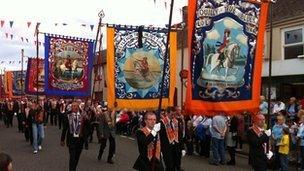Debate will continue even after Ardoyne parade
- Published

Thousands of Orangemen have been taking part in parades across Northern Ireland.
In the wake of its 4pm deadline for the Ligoniel Orange lodges to return home through north Belfast, the Parades Commission came in for a chorus of criticism from unionist politicians.
The Northern Ireland First Minister Peter Robinson, for example, called the Commission's ruling "utterly impractical" and claimed it had "demonstrated its total incompetence."
On Good Morning Ulster on 12th July, the DUP MP Jeffrey Donaldson suggested that if the Assembly had passed the DUP and Sinn Fein's Public Assemblies, Parades and Protests Bill then things might have been different.
Mr Donaldson, himself a senior Orangeman, accused the Commission of making a "crazy decision".
He expressed his belief that if the proposals published by the First and Deputy First Ministers in 2010, external had been "in place today we wouldn't be talking about this type of situation where those who engage in violence are rewarded and those who engage in peaceful activity are punished".
In confirming its response to the 4pm deadline, the Orange Order described its decision to bus a small group of members and a single band back in time to walk along the Crumlin Road as a "strategic" move in its "renewed and re-energised campaign to see the Parades Commission confined (sic) to history".
So how might things have been if the 2010 draft bill had passed the Assembly?
The measure faced considerable criticism, including over its handling of the right to freedom of assembly.
This led to the dropping of some contentious proposals - including a requirement for 37 days notice to be given for all public gatherings.
However the real death knell for the parading bill came when the Orange Order rejected it.
The DUP had lost a tug of war with the TUV and UUP over the affections of the Grand Orange Lodge.
Much of the raison d'etre for replacing the Parades Commission had been to create a new body with which the Orange Order would be prepared to do business.
In the light of the Orange Order's rejection there was no point pushing on, so the the DUP and Sinn Fein gave up on their draft bill.
Would anything have been different if the new architecture had been in place? Back in 2010 the proponents of the draft bill, external argued that a new emphasis would be placed on the need for dialogue and "local people providing local solutions".
One step forward would obviously be if the Orange Order, instead of boycotting the Parades Commission, started to liaise with the two new proposed bodies.
According to the 2010 draft bill, they would be an office where people apply for permission to hold a parade or a protest, and an 11 strong adjudication body charged with deciding what happens in the event of a dispute.
However ending the official boycott won't be a panacea for all ills.
Future
Some Orange lodges have already engaged in dialogue in their areas, and a mediator appointed by a new Office of Public Assemblies, Parades and Protests wouldn't necessarily prove any more persuasive than a go-between operating here and now.
Indeed when it comes to Ardoyne a very experienced team of mediators wasn't able to broker a deal.
Sources aware of those discussions suggest the mediators could have drawn up some kind of agreement between the loyalist North and West Belfast Parades Forum and the nationalist Crumlin Ardoyne Residents Association (CARA) which tends to reflect Sinn Fein's analysis.
But persuading the Greater Ardoyne Residents Collective (GARC) was another matter. GARC insists it is non party political but enjoys support from those, amongst others, who dissent from Sinn Fein.
The latest criticism of the Parades Commission may be a forerunner for another push for a replacement structure in the autumn.
The recent initiative by the Orange Grand Secretary Drew Nelson in addressing the Dublin Seanad, and a trip by an Irish government minister north to witness the 12th July celebrations in Fermanagh could point to a more consensual future.
But on the ground the mixture of marchers and protestors, loyalist band supporters and nationalist residents, Sinn Fein supporters and dissidents, remains potentially volatile and changing the brass plate above the door of any parading quango won't alter that.